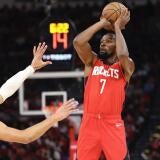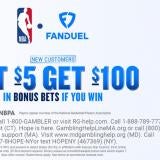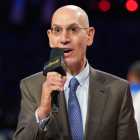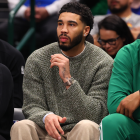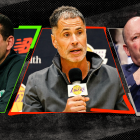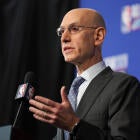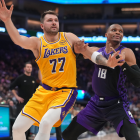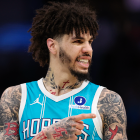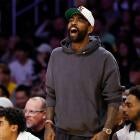That's Pretty Interesting: Suns' Devin Booker shining brighter than ever with new cast, stable ecosystem
For the first time in his professional career, the Phoenix guard is a part of something
Devin Booker's season isn't as much a breakout as it is a cleanse. His points and assists are slightly down, but his efficiency numbers have skyrocketed. His steals are down, but his defense has improved by leaps and bounds. His Phoenix Suns are 6-4, and they entered Tuesday's game against the Los Angeles Lakers with the league's fourth-best offense, eighth-best defense and second-best net rating, per Cleaning The Glass. Every part of this has been revelatory, especially considering what the first four years of Booker's career looked like.
A week before Booker's 21st birthday, and just three games into the 2017-18 season, the Suns fired coach Earl Watson. The timing was unusual, but no more so than losing by 48 points in the opener and by 42 points days later. Booker told me back then that he saw the news on Twitter, "like the rest of you." Jay Triano, Watson's replacement, was his third coach in as many seasons. Booker repeatedly said that, regardless of what was going on around him, he was trying to "control the controllables."
Phoenix, perhaps more than any other organization in the league would have, challenged Booker in that regard. He could not control that general manager Ryan McDonough was fired in training camp last season, mere months after hiring coach Igor Kokoskov and signing Booker to a five-year, $158 million max contract extension. He could not control that the Suns went that whole season without a proven point guard, nor that it fired Kokoskov at the end of it. But once Phoenix built a more functional, balanced team, he was ready to go.
It is not a stretch to say that Ricky Rubio and Aron Baynes have changed Booker's basketball life. With them in the starting lineup and Monty Williams on the sideline, the Suns are playing with a sense of purpose that they've lacked throughout Booker's tenure. Rubio has eased the playmaking burden on Booker, who no longer has to run endless pick-and-rolls against defenses that are zeroed in on him and less often has to bail out possessions with late-shot-clock isolations. Baynes has freed him with superb screens, unlocking a dribble-handoff two-man game that has been essentially impossible to defend because the center has made 50 percent of his 3s. Together they have solidified Phoenix's defense and added an element of unpredictability to its offense, allowing Booker to expend more energy guarding opposing wings and find easy buckets as a cutter.
Before this season, Booker did not often defend like this …
… or regularly benefit from assists like this:
… and screens like this:
Through 10 games, Booker has averaged 25.3 points on an absurd 54.1 percent shooting. He has made 51 percent of his 3s and 93.3 percent of his free throws. These numbers, however, are only significant insofar as they reflect the new context in which he has compiled them. None of Booker's teammates played for Triano or Watson, and, of the nine Suns who saw the floor on Tuesday, only four of them played for Kokoskov. Before this season, Booker was a divisive figure, a gifted scorer caught in a chicken-and-egg debate: Were the disorganized, defensively deficient Suns a mess because of Booker's flaws, or were his perceived flaws a product of the messy environment? His play this season suggests the latter is true (or at least much closer to the truth than the former).
The book on Booker was that he wasn't much of a defender, didn't shoot as well as you'd think and, while he looked the part of a star, his statistics were superficial. There are valid reasons to be skeptical of high-usage, low-efficiency players on awful teams, but Booker serves as a reminder that awful teams tend to have awful ecosystems, in which helpful players can look like scrubs and genuine stars can look limited. Even Hall of Famers are dependent on others: Giannis Antetokounmpo didn't get a single MVP vote before the Bucks hired Mike Budenholzer and surrounded him with shooters; Stephen Curry didn't get one before Steve Kerr replaced Mark Jackson and Draymond Green supplanted an injured David Lee.
Before this season started, Williams promised to help Booker become a household name. "Right now, you aren't because of all the organizational stuff," he told him, via The Undefeated's Marc Spears. "But you have the talent." The value of players like Baynes and Rubio is not just that they provide the cliched veteran experience and make what coaches call winning plays. It is that they stabilize lineups and help teammates get the most of their talent. In the most literal sense, they make the players around them better.
A similar story in Minnesota?
An even more drastic reinvention may be happening with the Minnesota Timberwolves' Andrew Wiggins, who has been even more maligned than Booker, for similar reasons. After a horrible preseason, the beginning of Wiggins' regular season was complicated -- he displayed some of his old bad habits and missed his first 13 shots from 3-point range, but excelled in crunch time and was clearly trying to find his comfort zone in Minnesota's modernized offense. Recently, though, he has been coming around.
In his last six games, Wiggins has been scorching. He has averaged 29 points on 50.4 percent shooting, including 40.5 percent from deep on seven 3-point attempts a game. He has not completely cut out midrange shots, but they have accounted for a healthier portion of his shooting diet. The most encouraging development, though, has been his passing. Wiggins has averaged 2.2 assists in his career, a startlingly small number for a high-usage wing. His assist totals in his last four games: six, seven, five, five.
It took no time for Karl-Anthony Towns to show what he could do with a spread floor and more playmaking responsibility. There was more of a learning curve for Wiggins, but he appears to be figuring it out. Spacing has a way of simplifying the game, and when he brings a playmaking mentality to his drives and pick-and-rolls, he can pile up assists with ease:
The ideal version of Wiggins, though, would also be able to use misdirection and the threat of his rim attacks to create shots for others. You know, like this:
After Minnesota's 120-114 win in Detroit on Friday, coach Ryan Saunders raved, via the Star Tribune's Chris Hine: "It's just him and his mindset and how he came into this season. Every good thing that happens to Andrew, Andrew deserves because Andrew does work hard and he had a different mindset this summer. Every conversation that was had, so all the credit goes to him for buying in and really delivering for us."
Some of these good things were borne out of necessity. Point guards Jeff Teague and Shabazz Napier have both missed the last four games, which has turned Wiggins into a de facto point guard and pushed two-way player Jordan McClaughlin into the rotation. The optimistic perspective is that there's no reason he can't keep playing this way when they come back -- an injury to Tony Battie spurred Stan Van Gundy's Orlando Magic to play Hedo Turkoglu and Rashard Lewis together, after all, and I've already mentioned the Draymond/Lee thing once in this column. The cynical perspective is that there is a larger, more meaningful sample size in which Wiggins could not credibly be described as a facilitator.
For the moment, though, Wiggins is thriving, and it's hard to ignore the gains he's made as a ballhandler. He is hardly ever turning the ball over, and he is playing with poise and confidence. He will need to make similar strides on defense to make his detractors stop mentioning his max contract, but he is undeniably in the best place he's been since signing it.
Houston House party
An anecdote that didn't make my story about Danuel House Jr.: In August 2017, House was without a team, having been cut by the Wizards as a rookie and only receiving limited playing time in summer league. As he told The Athletic, he earned James Harden's attention at the superstar's inaugural charity basketball tournament. The main event featured Harden and then-new teammate Chris Paul teaming up with DeMar DeRozan to take on John Wall and Marcus Morris, among other NBAers. House, however, had played his games earlier, with a team of local Houston players.
"I was just playing with the regular guys," he told me. No one at Rice University's Tudor Fieldhouse that day could have possibly known he would wind up where he is now. "I didn't have a job, so I felt like that was going to get me over the hump. Because those guys play really hard. A lot of people there, GMs and stuff, people coming out, checking it out, it's an opportunity waiting to happen. So I played in that game and then played against [Harden's] team and I performed really, really well.
"So he was just like, 'Dang who is that?' But he knew me. So he was like, 'Aren't you supposed to be playing with the NBA [players]?' I was like, 'No, I got waived.' He said, 'What?'
"And then we kept in contact."
An offense that keeps you up at night
Here's 76ers coach Brett Brown effectively summing up where his team is in an interview with NBA.com's John Schuhmann that took place after their third game of the season:
"I go through and I just watch our defense -- I normally don't break the game up like this -- and as I watch our defense, I'm like, 'OK, if you put me in a closet and drug me out and you watched us play defense, for the most part, I'm proud.' We play hard. I think that we will arrive in April where we need to arrive.
"We're learning about Al Horford as a rim protector. I'm learning about J-Rich [Josh Richardson] guarding point guards. I'm learning about people's switchability vs. I got to keep them connected on somebody like I had to do with J.J. [Redick]. You learn, but I feel like we're trending where I want to go.
"Then you take me out of that closet and you put me in front of a video and say, 'Here's the team after three games offensively,' and I'm crushed. I don't like what I saw that night. I did like what I saw against Boston, in Detroit. I didn't, at all, like what I saw against Atlanta.
"So there's no finite date. I hope, in my own mind, I'm growing it and coaching it the way I want, and shaping it in the first third [of the season]. But it's never-ending. It keeps coaches up at night. I think the offensive design of our team needs to be well thought through, from my standpoint."
Philadelphia is 7-3 after surviving a scare against the Cleveland Cavaliers on Tuesday, a 98-97 victory in which Tobias Harris and Richardson combined to shoot 1-for-19 from 3-point range. The Sixers are 19th in offense, and while normal early-season caveats apply, the overall lack of flow is disturbing. And it is probably disturbing Brown's sleep.
10 more stray thoughts: Tristan Thompson is having himself a season, and I didn't just say that because he MADE TWO 3-POINTERS AGAINST THE SIXERS … It seems notable that a day before Dion Waiters' mid-flight panic attack, caused by an edible containing THC, former commissioner David Stern reiterated his opinion that the NBA's marijuana policy is outdated … At what point is LeBron James' poor (for him) finishing around the rim going to become a thing? … I swear I'm not just concern-trolling the Lakers, but that Anthony Davis quote about his shoulder didn't sound great … The Nets' defense is, uh, not where it should be … No one is having more fun than Trae Young … Imagine if Jabari Parker starts hitting his 3s … Speaking of 3s, what if Brook Lopez can't replicate last season? … Where were you when Coby White ascended to a higher plane of existence? … Chris Boucher!


